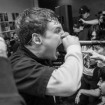Revolver has teamed with Inclination for an exclusive "half black/half orange crush" vinyl variant of Unaltered Perspective — limited to 250 copies. Order yours from our shop.
"If you want Louisville to thrive, you have to put work in. I tell people: Your shows, your venues, your bands might be cooler, but we like hardcore more than you. We just do."
That's Isaac Hale, and he knows a thing or two about building a buzzing hardcore community. As guitarist for Knocked Loose, he's helped propel his Kentucky band from grassroots heroes to widely celebrated heavyweights leading the way in modern hardcore. And if he wasn't busy enough with that (or his production duties for SeeYouSpaceCowboy, Wristmeetrazor and more), Hale is also putting in work with his side project Inclination — the emerging straight edge metallic hardcore outfit he formed with fellow Kentuckian Tyler Short.
Inclination have released two ripping, cred-building EPs, 2017's Midwest Straight Edge and 2019's When Fear Turns to Confidence, that, as Hale jokes, could be described as "superhero straight edge" — because vocalist Short presented himself as indestructible and incorruptible thanks to his clean-living ideals. But on their new debut full-length, Unaltered Perspective, things get more complex. Short takes off the mask.
"The best part of the superhero movie is when the superhero's human," he says. "And that was what I wanted to do with this record — just be human."
Set to unrelenting metalcore, his lyrics about loss, abandonment, healing and rage are vulnerable and candid. It's an album that explores, beyond finger-pointing, the true ramifications of living in a society torn by addiction — a powerful musical statement that has Inclination poised for their own breakout moment.
Growing up, the now 34-year-old Short was a skinny, skateboarding misfit who discovered punk rock through skate videos. When kids around him started smoking weed, he wasn't interested. "The kids who did it stopped skating," he recalls. "All I wanted to do was skateboard, get all scraped up and bloody, and then do it again."
Around 2013, Short attended one of Knocked Loose's earliest shows, which is where he first witnessed a then 16-year-old Hale playing guitar. Short was nine years his elder, but immediately respected Hale for both his musical skills and devotion to the Louisville scene (the kid was a front-row fixture at nearly every show). The pair bonded over their love for hardcore, and commitment to turn the small, struggling scene into a thriving one. Before Hale's touring responsibilities with Knocked Loose became too heavy, the musician recorded a demo for almost every local band that wanted one. Short, meanwhile, formed LDB Records in 2016 to work with small groups who would otherwise never be pressed to vinyl.

Inclination grew out of their friendship in 2017, and — much like the Louisville scene itself — the band has been evolving ever since. A big jump in that evolution occurred in 2020 when Inclination, which is completed by bassist Caleb Murphy, guitarist Peter Katter and drummer Christopher Mills, began writing Unaltered Perspective. After those two initial EPs, Short felt like he didn't have much more to say about simply being straight edge. But as he investigated the roots of his beliefs, he found that it led to much wider conversations.
"It's not just the culture; it's the corporations," he says. "There's a monetary influence to why we're prescribed these pills, because people want us to be docile. It was important to me to have a bigger conversation about what it means to be a part of this world [and] not to turn away from the truth."
Short's new truth-seeking approach manifested on "Epidemic," which addresses a broken healthcare system (with help from Indecision singer Tom Sheehan), "Thoughts and Prayers," which spits fury at politicians ignoring the opioid crisis, and "A Decision," which reflects on the choice to become straight edge (and includes vocal assists from One Step Closer's Ryan Savitski and Magnitude's Russ Bussey). Short's politics were informed, in part, by working at the same corporate grocery store since he was 16 and seeing starvation wages and exploitation up close. Musically, he was inspired by the storytelling of folk songwriters including Bob Dylan and Steve Earle.
There were deeply personal factors at play in Short's lyricism, too. As he was writing, his childhood best friend died of a drug overdose. "The Christmas when I was 12 … I received my first skateboard [and] my friend Ian down the street received his first skateboard," he recalls. "We were skating in the only dry patch of concrete … 'cause it had snowed, just trying to ollie. That [memory] is burned in my brain… And now he's gone." Short began writing "Predetermined" on the way home from the funeral, a moment crystalized in the song's piercing line: "An unavoidable end for my first best friend."
He digs deeper into his own self on "Marooned" and "Connections," which address mental health issues. Short has been in therapy for the last few years, a process that led him to the realizations expressed on "Commitment to Self." "[The] commitment [is] to try to be better, more insightful, more appreciative," he says, "to be wide-eyed to the world, to yourself and all of your problems and shortcomings, and to try to be more mindful to not walk the same roads again."
It's a sentiment that's brought Inclination, as a whole, to an entirely new level, Hale attests. "Tyler's lyric game and vocal performance on this one is by miles the best thing that he's ever done. … This record turned out to be way darker, way more serious [and] better than I ever could have imagined."
And though he's the first to admit he's no superhero, Short ultimately owes the progress he has made, and the vulnerability he was able to unlock on this album, to straight edge. "I haven't tried to disconnect from reality," he says. "I've looked into the abyss, and it's looking back at me. I'm in a staring contest with the abyss now. And I'm unwilling to look away until it gets better."








